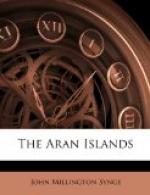His pronunciation was lost in the rasping of his throat, and, though he shrieked into my ear to make sure that I understood him above the howling of the wind, I could only make out that it was an endless ballad telling the fortune of a young man who went to sea, and had many adventures. The English nautical terms were employed continually in describing his life on the ship, but the man seemed to feel that they were not in their place, and stopped short when one of them occurred to give me a poke with his finger and explain gib, topsail, and bowsprit, which were for me the most intelligible features of the poem. Again, when the scene changed to Dublin, ‘glass of whiskey,’ ‘public-house,’ and such things were in English.
When the shower was over he showed me a curious cave hidden among the cliffs, a short distance from the sea. On our way back he asked me the three questions I am met with on every side—whether I am a rich man, whether I am married, and whether I have ever seen a poorer place than these islands.
When he heard that I was not married he urged me to come back in the summer so that he might take me over in a curagh to the Spa in County Glare, where there is ‘spree mor agus go leor ladies’ (’a big spree and plenty of ladies’).
Something about the man repelled me while I was with him, and though I was cordial and liberal he seemed to feel that I abhorred him. We arranged to meet again in the evening, but when I dragged myself with an inexplicable loathing to the place of meeting, there was no trace of him.
It is characteristic that this man, who is probably a drunkard and shebeener and certainly in penury, refused the chance of a shilling because he felt that I did not like him. He had a curiously mixed expression of hardness and melancholy. Probably his character has given him a bad reputation on the island, and he lives here with the restlessness of a man who has no sympathy with his companions.
I have come over again to Inishmaan, and this time I had fine weather for my passage. The air was full of luminous sunshine from the early morning, and it was almost a summer’s day when I set sail at noon with Michael and two other men who had come over for me in a curagh.
The wind was in our favour, so the sail was put up and Michael sat in the stem to steer with an oar while I rowed with the others.
We had had a good dinner and drink and were wrought up by this sudden revival of summer to a dreamy voluptuous gaiety, that made us shout with exultation to hear our voices passing out across the blue twinkling of the sea.
Even after the people of the south island, these men of Inishmaan seemed to be moved by strange archaic sympathies with the world. Their mood accorded itself with wonderful fineness to the suggestions of the day, and their ancient Gaelic seemed so full of divine simplicity that I would have liked to turn the prow to the west and row with them for ever.




